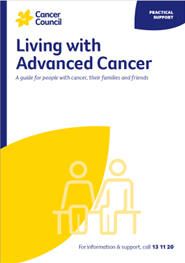- Home
- About Cancer
- Advanced cancer
- Living with advanced cancer
- The people in your life
- Talking to friends
Talking to friends about advanced cancer
Friends can be invaluable for emotional and practical support, especially if you’re not close to your family or they live far away. Some friends can listen to whatever you say – complaints, hopes, fears – without judging you or trying to cheer you up or give advice. Others may avoid you or not want to talk about the diagnosis.
If friends seem to stay away, they may not know what to say or assume you don’t want visitors. Let them know if you want to keep in touch.
They may avoid talking about the cancer, worried it will upset you. You could explain if, and how much, you want to talk about it, or if it’s okay to just discuss other things.
If friends are overprotective or won’t leave you alone, it can help to set boundaries to maintain your independence.
Conversations with friends
- Set limits around how much you want to share – you can simply say you’d like to talk about something else.
- Ask friends how they feel about the diagnosis – this gives them permission to discuss the situation.
- Be as specific as possible when friends ask how they can help.
- If you don’t need particular help from friends or family, let them know that their offer is still appreciated and that you might need something in the future.
- If friends offer information or advice that you’re not comfortable with – such as details of an alternative therapy they heard of – change the topic or let them know you are happy with the care provided by your treatment team. You could say that it’s something to consider if you are looking change your treatment.
→ READ MORE: Ways to share how you’re feeling
Podcast: How to Help Someone with Cancer
Listen to more of our podcast for people affected by cancer
More resources
Dr Lucy Gately, Medical Oncologist, Alfred Health and Walter and Eliza Institute for Medical Research, VIC; Dr Katherine Allsopp, Supportive and Palliative Care Specialist, Westmead Hospital, NSW; A/Prof Megan Best, The University of Notre Dame Australia and The University of Sydney, NSW; Dr Keiron Bradley, Palliative Care Consultant, Medical Director Palliative Care Program, Bethesda Health Care, WA; Craig Brewer, Consumer; Emeritus Professor Phyllis Butow, Psychologist, The University of Sydney and Chris O’Brien Lifehouse, NSW; Louise Durham, Palliative Care Nurse Practitioner Outpatients, Princess Alexandra Hospital, Metro South Palliative Care, QLD; Dr Roya Merie, Radiation Oncologist, ICON Cancer Centre, Concord, NSW; Penny Neller, Project Coordinator, National Palliative Care Projects, Australian Centre for Health Law Research, Queensland University of Technology, QLD; Caitriona Nienaber, 13 11 20 Consultant, Cancer Council WA; Xanthe Sansome, Program Director, Advance Care Planning Australia, VIC; Sparke Helmore Lawyers; Peter Spolc, Consumer.
View the Cancer Council NSW editorial policy.
View all publications or call 13 11 20 for free printed copies.

